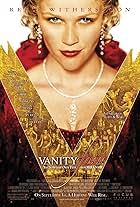This cinematic adaptation of William Makepeace Thackeray's novel stars Myrna Loy in her first starring role.This cinematic adaptation of William Makepeace Thackeray's novel stars Myrna Loy in her first starring role.This cinematic adaptation of William Makepeace Thackeray's novel stars Myrna Loy in her first starring role.
Ray Culley
- Casino patron
- (uncredited)
Bill Elliott
- Minor Role
- (uncredited)
Tom Ricketts
- Sir Pitt's Butler Parker
- (uncredited)
- Director
- Writers
- All cast & crew
- Production, box office & more at IMDbPro
Storyline
Did you know
- TriviaShot in ten days.
- Quotes
Joseph Sedley: Ever been to Brighton?
Becky Sharp: Brighton? No, never.
Joseph Sedley: How would you like to come with me for a weekend?
[lecherous wink]
Joseph Sedley: Lovely place. Lots of fun. Lots of champagne.
- ConnectionsReferenced in Hollywood Hist-o-Rama: Myrna Loy (1961)
Featured review
I bought this DVD as part of a set of 50 "historic classics." It's hardly a classic, and as the plot was updated to the time of its release, is not historic either. The actual title on the DVD is "Indecent," and additionally subtitled "The Private Life of Becky Sharp." Myrna Loy is not very convincing, although in her defense she is saddled with an awful script and trite dialogue. As with many early talkies, and especially ones made by smaller studios, there is little skill demonstrated by the cast and crew. Loy does wear a few gowns that are quite stylish, but her costumes and make-up in the later scenes are overdone. The one saving grace is a tolerable performance by Billy Bevan, who plays one of her many suitors
- bernard-belanger
- Dec 29, 2007
- Permalink
Details
- Runtime1 hour 18 minutes
- Color
- Aspect ratio
- 1.37 : 1
Contribute to this page
Suggest an edit or add missing content

































